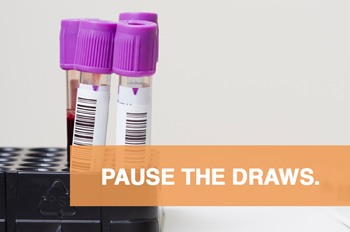Only when “absolutely necessary” – reducing unnecessary bloodwork

By Amber Daugherty

Patients in the hospital may undergo multiple blood tests a day – it’s one of the ways health-care teams check on their recovery. But too many blood draws can contribute to a condition called anemia, a reduction in healthy red blood cells or hemoglobin, which can keep a patient in the hospital longer and potentially lead to worse health outcomes.
To help keep patients safer, teams at St. Michael’s Hospital have been working over the past few years on reducing what are known as reflexive blood draws – tests that are done unnecessarily and aren’t contributing to care.
“First of all, blood draws hurt – to be poked with a needle every day when you’re sick in the hospital is not very comfortable,” says hematologist Dr. Lisa Hicks, “and so for that simple reason we want to make sure that every test done is absolutely necessary.”
As a result of the teams’ work, blood collection has now been reduced by up to 27 per cent in some units. Adopted across the hospital, this initiative is also being championed nationwide thanks to a toolkit Hicks and her colleagues created for Choosing Wisely Canada, which provides a step-by-step approach for hospitals to reduce repetitive tests.
“We have a particular focus on trying to decrease overutilization that may contribute to patient harm,” says Dr. Hicks, “because providing unnecessary care not only contributes to costs of health care but can also expose patients to risks and side effects and inconvenience. We want to always be on the lookout to make sure our care is really the best possible care in every way.”
The team at St. Michael’s is currently working on expanding the project to the Medical-Surgical ICU with a goal of rolling it out to all four ICUs at the hospital.
“All the tests that we take as routine have greater meaning for patients and families in the ICU,” says Joyce Fenuta, program director for specialized complex care. “Blood tests in themselves and waiting for results creates anxiety so if we can reduce the number of tests, we can potentially help reduce a lot of anxiety for patients and families and relieve some stress in what is already a very stressful situation.”
In addition, Dr. Hicks says that patients in the ICU are more vulnerable to some of the potential harms of repetitive blood testing.
“The ICU is a really special environment – patients are sicker and require much closer monitoring,” she says. “I think we’re seeing a new normal. The project has been embraced by clinical teams throughout the hospital – there was a real willingness and eagerness to get rid of reflexive testing and make sure that every blood test counts, which is amazing because it means we’re helping keep our patients safer.”
About St. Michael’s Hospital
St. Michael’s Hospital provides compassionate care to all who enter its doors. The hospital also provides outstanding medical education to future health care professionals in more than 29 academic disciplines. Critical care and trauma, heart disease, neurosurgery, diabetes, cancer care, care of the homeless and global health are among the Hospital’s recognized areas of expertise. Through the Keenan Research Centre and the Li Ka Shing International Healthcare Education Centre, which make up the Li Ka Shing Knowledge Institute, research and education at St. Michael’s Hospital are recognized and make an impact around the world. Founded in 1892, the hospital is fully affiliated with the University of Toronto.
St. Michael’s Hospital with Providence Healthcare and St. Joseph’s Health Centre now operate under one corporate entity as of August 1, 2017. United, the three organizations serve patients, residents and clients across the full spectrum of care, spanning primary care, secondary community care, tertiary and quaternary care services to post-acute through rehabilitation, palliative care and long-term care, while investing in world-class research and education.
